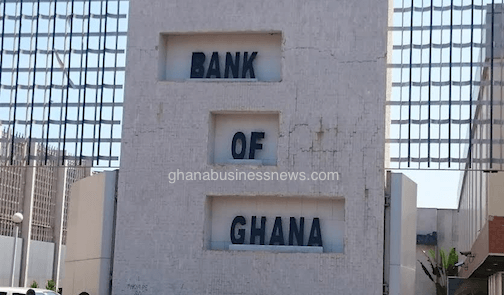Bank of Ghana cuts policy rate to 20%
 The Bank of Ghana has announced a reduction in the policy rate from 21 per cent to 20 per cent, a 100 basis point cut. The Governor of the Central Bank made the announcement today November 27, 2017 at a press conference at the Bank’s headquarters in Accra.
The Bank of Ghana has announced a reduction in the policy rate from 21 per cent to 20 per cent, a 100 basis point cut. The Governor of the Central Bank made the announcement today November 27, 2017 at a press conference at the Bank’s headquarters in Accra.
In September this year, the Bank maintained the policy rate at 21 per cent as the fiscal consolidation process remained broadly on course.
According to the Governor, Dr Ernest Addison, several factors that informed the decision to cut the rate include the fact that global growth has strengthened further since the last MPC meeting, sustained by strong growth in demand and recovery in investments and trade.
“The recovery process has also expanded beyond advanced economies to include large emerging market economies. Growth in sub-Saharan Africa is also slowly rebounding.
The improved global growth conditions notwithstanding, inflation remains subdued. Although the US Fed has started trimming its balance sheet with the possibility of rate increases in December and in 2018, monetary policy in other advanced countries remains broadly accommodative,” he said.
He indicated further that these favourable external conditions could impact positively on the domestic economy through the financing and trade channels.
“Price developments during the first 10 months of the year continued to show signs of dampening inflation expectations. Headline inflation measured by the consumer price index was 11.6 per cent for October 2017, a reflection of a steady decline in inflation since the beginning of the year with the exception of April and August, when inflation ticked up slightly. All the Bank’s indices of core inflation continued to decline in October, pointing to a downward trend in underlying inflation, well within or close to the end year inflation target,” he noted.
The Governor said prices of Ghana’s major export commodities continued to firm up in the international commodities market.
“In particular, crude oil prices have strengthened in recent weeks reflecting geopolitical tensions, supply constraints and strong demand. Also, the price of gold moderated slightly, though still high, as the global economic recovery gained traction. However, cocoa prices remain depressed by excess supply due to favourable weather patterns across the West African sub-region,” he said.
He also said developments in the real sector show an expanding economy.
“Provisional real GDP estimates from the Ghana Statistical Service showed that the economy grew by 6.6 per cent and 9.0 per cent in the first and second quarters respectively, and is projected to end the year at 7.9 per cent driven mainly by the oil sector. Non-oil GDP growth was 3.9 per cent in the first quarter and 4.0 per cent in the second quarter.
Meanwhile, the Bank’s updated Composite Index of Economic Activity recorded an annual growth of 3.2 per cent in September 2017, compared to 3.1 per cent in the same period last year,” he added.
By Emmanuel K. Dogbevi
Copyright ©2017 by Creative Imaginations Publicity
All rights reserved. This news item or any portion thereof may not be reproduced or used in any manner whatsoever without the express written permission of the publisher except for the use of brief quotations in reviews.
